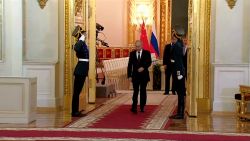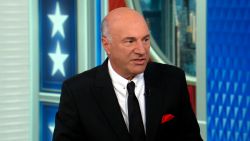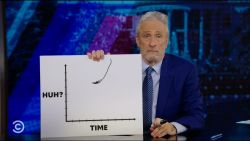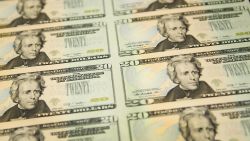The West has responded to Russia’s invasion of Ukraine with round after round of punishing sanctions. The latest salvo is designed to spark a banking crisis, overwhelm Moscow’s financial defenses and tip the Russian economy into a deep recession.
Never before has an economy with the global importance of Russia’s been targeted with sanctions at this level, according to analysts, who say there is now a high risk that Russia will face a financial crisis that pushes its largest banks to the brink of collapse.
Western officials have described their campaign as an economic war meant to punish President Vladimir Putin and turn the country he leads into an international pariah — even if it takes years for sanctions to destroy the defenses of Russia’s “fortress economy.”
“We will provoke the collapse of the Russian economy,” French Finance Minister Bruno Le Maire told a local news channel on Tuesday.
Russia’s status as a global energy supplier will make that mission all the more difficult. Europe gets nearly 40% of its natural gas and 25% of its oil from Russia, and any disruptions to those exports would cause already elevated global prices to rise even further.
How the West is fighting
Putin’s invasion of Ukraine has been met with an unprecedented response from the United States, the United Kingdom, the European Union, Canada, Japan, Australia and other countries. Even Switzerland, famous for its neutrality and banking secrecy, has pledged to impose sanctions on Russia.
The West has cut off Russia’s two largest banks, Sberbank (SBRCY) and VTB, from direct access to the US dollar. It has also taken steps to remove some Russian banks from SWIFT, a global messaging service that connects financial institutions and facilitates rapid and secure payments.
The coalition is trying to prevent Russia’s central bank from selling dollars and other foreign currencies to defend the ruble and its economy. In total, nearly $1 trillion worth of Russian assets have now been frozen by sanctions, according to Le Maire.
“Western democracies have surprised many by pursuing a strategy of exerting intense economic pressure on Russia through effectively cutting it off from global financial markets,” Oliver Allen, markets economist at Capital Economics, said in a research note.
“If Russia continues on its current path, it is quite easy to see how the latest sanctions could be just the first steps in a severe and enduring severing of Russia’s financial and economic ties with the rest of the world,” he added.
Western countries have ruled out sending troops to fight in Ukraine, leaving sanctions as the primary means of challenging Russia. The measures could wipe as much as 6% off Russia’s gross domestic product, according to Oxford Economics.
“Our strategy, to put it simply, is to make sure that the Russian economy goes backward as long as President Putin decides to go forward with his invasion of Ukraine,” a senior US administration official told reporters.
Russia’s ‘fortress’ economy
Since 2014, when the United States and its Western allies imposed sanctions on Moscow following the annexation of Crimea and the downing of Malaysian Airlines Flight 17, Putin has been trying to sanction-proof Russia’s $1.5 trillion economy, the 11th largest in the world.
Moscow has attempted to wean its oil-dependent economy off the dollar, limited government spending and stockpiled foreign currencies.
Putin’s economic planners have also sought to boost domestic production of certain goods by blocking equivalent products from abroad. Russia’s central bank has meanwhile amassed a war chest of $630 billion in reserves including foreign currencies and gold — a huge sum compared to most other countries.
Those defenses are now being severely tested.
The sanctions have rendered roughly 50% of Russia’s foreign reserve stockpile useless, according to Capital Economics.
“External conditions for the Russian economy have drastically changed,” the Russian central bank said Monday, announcing that it would roughly double interest rates to 20%. “This is needed to support financial and price stability and protect the savings of citizens from depreciation,” the bank added.
Russia is also imposing capital controls. The central bank ordered companies to sell foreign currencies on Monday to prop up the ruble as it plunged to a record low against the US dollar. And Putin is planning a decree that would temporarily ban foreign companies and investors from selling Russian assets — which have become toxic for many since the invasion.
“The $600 billion-plus war chest of Russia’s foreign reserves is only powerful if Putin can use it,” a senior Biden administration official told reporters.
What happens next
All eyes are on the Russian financial system.
There were reports over the weekend that Russians were standing in long lines to withdraw cash from ATMs, raising the prospect of a run on the country’s banks. Already the main target of sanctions, Russian banks could come under even greater pressure if borrowers are unable to repay loans as the inevitable recession hits businesses and households.
Liam Peach, an emerging markets economist at Capital Economics, said that Russian banks could be forced to respond by selling assets — probably on the cheap. Credit could become scarce, making the economic pain from sanctions even worse.
“The ratcheting up of Western sanctions over the weekend has left Russian banks on the edge of crisis,” said Peach.
One early casualty was the European subsidiary of Sberbank, Russia’s biggest lender that has been sanctioned by Western allies. The European Central Bank said Monday that Sberbank Europe, including its Austrian and Croatian branches, was failing, or likely to fail, because of “significant deposit outflows” triggered by the crisis.
Another problem is that Russian banks only have enough foreign cash on hand to cover roughly 15% of the foreign currency deposits on their books. The central bank would normally supply banks with foreign currency, but with half its war chest out of bounds it may not be able to do that, and defend the ruble at the same time.
The central bank could be under pressure for months or even years.
Thanks to oil and gas, the value of Russia’s exports far exceeds imports, and payments into the country are a major source of foreign currency. But investors and businesses could try to move large amounts of foreign cash outside the country as the ruble falls, forcing the central bank to spend up to $100 billion of its available reserves this year, according to Capital Economics.
At the same time, the West could crack down even harder. The United States and its allies could remove more Russian banks from SWIFT and further restrict their access to dollars and euros, according to the Institute of International Finance. They could also cut off Russian energy exports, although that would cause prices to spike.
Further escalation of the economic conflict could have major consequences.
“Don’t forget that in human history, economic wars quite often turned into real ones,” former Russian President Dmitry Medvedev said Thursday in response to Le Maire’s comments.



























